President's Message
We have a very special meeting on June 2nd at the Clarke-Palmore House. The Varina Woman's club is hosting refreshments in recognition of their assistance in founding the Henrico County Historical Society in 1975. We have enjoyed a close association over the 38 years, and we appreciate their hospitality. We will also be entertained by a performance of the Henrico Concert Band. Vicki Stephens, chair of the HCHS Cemetery Committee, is a member of the band and and plays the tuba. I hope you can join us for an old fashioned social under a tent at the Clarke-Palmore House.
In September, we have another exciting meeting planned at the "Citie of Henricus." We have changed the date from the usual Sunday to Saturday, September 7 in order to take advantage of an optional "History and Nature Tour" by boat of the area where Henrico traces its origin in 1611 as the second successful English settlement after Jamestown. We will have the usual business meeting at the Education Center at Henricus, but if you plan to take the optional boat tour, you will need to pre-register. A form for registration is provided in this issue or on our website at www.henricohistoricalsociety.org.
As mentioned in the previous issue, this year Meadow Farm is celebrating its 300th anniversary of the original land grant. Meadow Farm is a living history museum that depicts life on a farm in the mid 1800s. There are farm animals and a garden where fresh vegetables are grown. One thing missing in the interpretation is a kitchen. Demonstration of 19th century cooking had previously been performed in the basement of Meadow Farm, but after damages resulting from Hurricane Isabelle were repaired and other restoration work done, it was considered too risky to have a kitchen in the basement of the historic farmhouse. Archeological inspection revealed there had previously been a separate kitchen building. Because there is no funding available, the Henrico County Historical Society and the Friends of Meadow Farm are partnering to start a series of fundraising events to raise money for building a 19th century kitchen. We feel that it is an especially important feature to demonstrate to school children where their food comes from and how to prepare it. Consideration is also given to the interpretation of African slaves who likely prepared the food at Meadow Farm and what that influence had on American culture. The Friends of Meadow Farm is an all-volunteer non-profit organization that assists with programs and all things related at Meadow Farm.
Meadow Farm/Crump Park is such a wonderful contribution to the community and this project would benefit from community efforts. Notices of special fundraising events will be forthcoming as planning progresses. We hope you will participate in this worthwhile project.
If you would like to make a contribution to the "Meadow Farm Kitchen Project," please contact:
Friends of Meadow Farm
P.O. Box 1553
Glen Allen, VA 23060
or
Henrico County Historical Society
P.O. Box 90775
Henrico, VA 23273
Another project under way is an updated email address file of members so that notices of meetings and other events can be sent on a current basis. If you would like to be added to this list, please contact me at sarah.pace@verizon.net. Announcements of HCHS events can be found in the quarterly newsletter, on the HCHS website, and on the HCHS Facebook page; however, if you are listed in the email file, reminders can be sent on an individual basis.
Best wishes,
Sarah Pace, President
>Back to Top<
About the Clarke-Palmore House
The Clarke-Palmore House was built in stages beginning in 1819. John Clarke purchased the property in 1855 and added the second story. His daughter Estelle and her husband John Palmore added the clapboard section 1910. In 1999, Vera Morton, daughter of John and Estelle Palmore, donated the house and 12 acres to Henrico County.
The house is located at 904 McCoul Street, and is indicated with the marker containing "A" on the map.
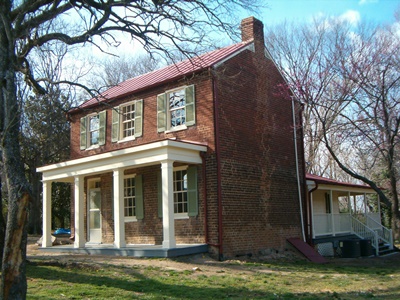
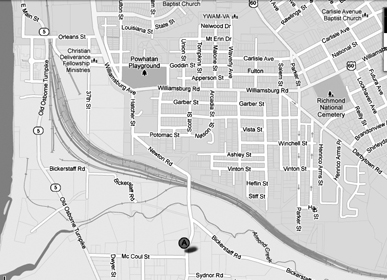
>Back to Top<
APHA Marks Significant Sites at Turkey Island
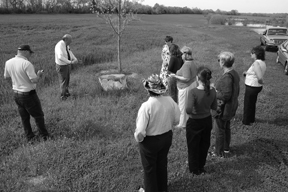
The Association for the Preservation of Henrico Antiquities held its April 14 meeting at Turkey Island, site of the Randolph family's home on the James River. Members walked the grounds and viewed the location of the Randolph house's original foundation, which has been encapsulated, or covered over in order to preserve it. In the left photograph, President Henry L. Nelson, Jr. points out the marker that the association has had placed there (right).
The group then turned around and walked the short distance to the family cemetery. The APHA was responsible for the clearing and reclearing of the dense overgrowth in the cemetery and for the stabilization of the surrounding wall. The small markers beside the graves bear numbers corresponding to a plaque on the cemetery wall placed by the APHA to identify the family members' graves.
Additionally, the APHA has placed table-top markers at a pull over on the south side of Route 5 just west of Turkey Island Road.
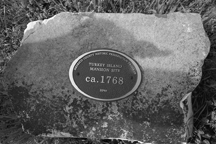
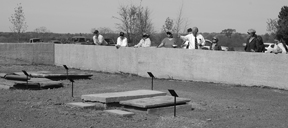
>Back to Top<
March HCHS Meeting Features Local Reminiscences
At their March 3 meeting at Meadow Farm, Henrico County Historical Society members heard from Reuben Burton, who spoke on Henrico County in the 30s & 40s. Mr. Burton, pictured left in the middle photograph with Welford Williams, grew up in a house in the west end of the county on Skipwith Road (bottom).
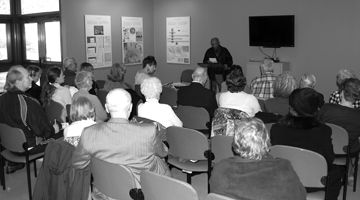
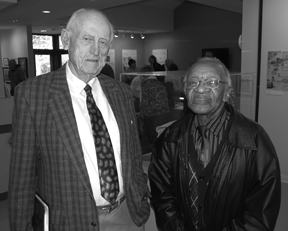
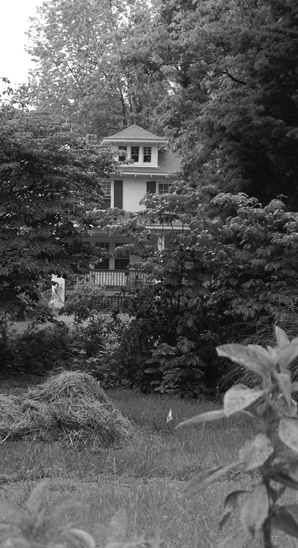
Then Mr. Williams shared his memories of his work as a security guard for the county during the 70s. He also shared his photos of Meadow Farm during that period and a county-produced DVD featuring his experiences as a security guard.
>Back to Top<
Sign Up Now for Our September Boat Tour
Our quarterly September meeting will be changed to Saturday, September 7, at the Education Center at Henricus Historical Park. Part of the program at Henricus is a boat tour whose cost is $25.00. It is a 45-minute tour that can accommodate 6 people at a time. To fit our schedule, times for the boat tour have been staggered (1 p.m., 2 p.m., and 3 p.m.). If necessary, they said we can add additional times, but we need to know who will be going. If you would like to reserve a place on the boat tour, contact Sarah Pace at 839-2407 or at sarah.pace@verizon.net to sign up.
Information on the boat tour can be found at http://henricus.org/openings-on-history-nature-boat-tours-of-the-james-river/.
>Back to Top<
Make Plans for the September Tea Dance
We're also planning a tea dance on September 29 at Walkerton. Mark the date and check out the HCHS website for information to be posted later.
>Back to Top<
Meadow Farm Celebrates 300th, Looks for Sheppard Descendants
Meadow Farm is celebrating its 300th anniversary of the original land grant this year, and the staff is looking for Sheppard descendants.
Pam Greene at the Division of Recreation and Parks is doing the research and asks that anyone who may have a connection to contact her at gre10@co.henrico.va.us.
>Back to Top<
Varina High School: Renovated, Rededicated and Ready for 50 More
In 1909, . . .
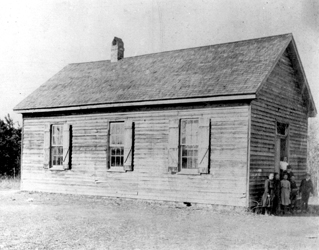
. . . Fort Harrison, . . .
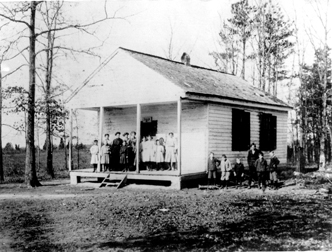
. . . Osborne, . . .
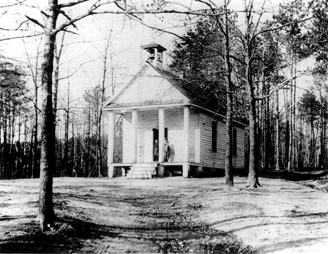
. . . Town Hall, . . .
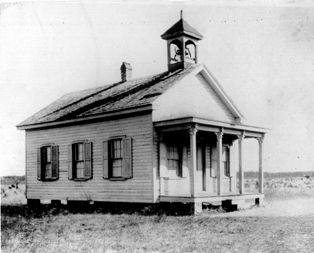
. . . and Laurel Hill, . . .
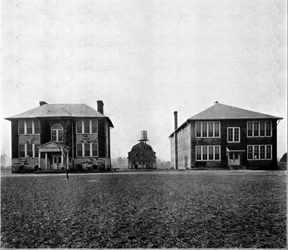
. . . four one-room schools, were consolidated to form the Varina School, only the second consolidated school to be opened in Virginia. The original 1909 building (far left below) no longer stands. In the 1920s, an agricultural facility was added, and through the years, the site has undergone numerous changes.
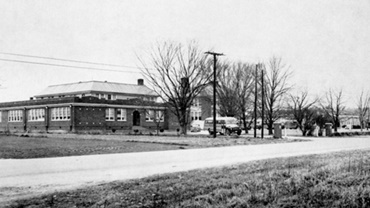
In 1963, Varina High School moved to its present location on Messer Road. Not only does 2013 mark its fiftieth year at that site, but it also marks the end of a three-year renovation to the school.
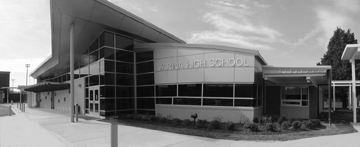
On May 5, 2013 at 3:00 p.m., fifty years to the minute after the original dedication ceremony of the Messer Road facility Varina High School held a rededication ceremony.
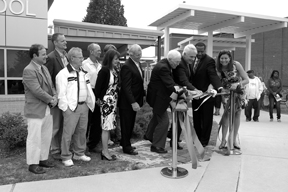
Ribbon Cutting:
Varina principal Tracy Omohundro, Varina Supervisor Tyrone Nelson, School Board Member John Montgomery and former Varina principal and School Board Member Hugh Palmer officially open the installation of memorial pavers as architects Bo Fairlamb and Charles Piper, construction supervisor Terry Pulliam, Gary Blow, assistant principal Katy Noah and former Varina Supervisor Jim Donati look on.
>Back to Top<
An Army Travels on Its Stomach
Certainly, the life of the Civil War foot soldier could be harrowing. As "Unkle Jim" of the 30th Virginia Infantry Regiment wrote to his niece Helen from the trenches on Turkey Hill on 11 June 1864: "My time has been spent since I wrote you last behind earth works in a ditch 4 feet wide [T]" the enemy line is about 10 yds in front skirmishers between who are continually firing at each other. The bullet from the enemy flying over us making it dangerous almost to raise our heads above the bank...O what would I give if Grant was whiped, routed, dimoralized and on his way to Washington to I could walk about where I pleased and breath freely without expecting every minute to be struck in the head by one of those kittens that go squeeling through the air...What I would give if my ears could have a respite from the sound of artilery and musket roar. What would I give to stand on terrafirma that would vibrate no more from the concussion of the cannon boom." For Unkle Jim the constant threat of injury or death, while it seemed to numb his senses, could not numb his sense of rhythm, poetry, and metaphor.
And while accounts of battle experiences abound, other writings from the war record more mundane concerns of the day-to-day life of the soldier and illustrate more basic human wants and needs that the exigencies of war exacerbated. One of those is the concern for food, and several letters and a short diary of Paul M. Higginbotham are peppered with references to food-what is desired, what has been eaten, what can be bought, what is anticipated.
Higginbotham was from Buffalo Springs in Amherst County, Virginia, and he served in the 19th Virginia Infantry Regiment. On 14 September 1864, he arrived at the camp at Chaffins's Farm in Henrico County after a six-day 120-mile march from Sommerville Ford on the Rapidan River. On 18 September 1864 he writes to his cousin Hettie R Gibson:
"Our Brigade and Kempers took the place of General Wise's Brigade, and that has gone to Charleston.
They had been at this place for 18 months and were finely fixed. They had fine gardens planted with all kinds of Vegetables &c and were living as well as if they were home...I feel very thankful to [Governor John] Letcher for his kindness in placing us where we can have some rest."
Paul was happy at the prospect of fresh "Vegetables &c," and the theme of food had been evident in neatly, written entries on the lined paper his small 3 3/4" x 5 3/4" diary kept from early May to mid June of 1862 during the Peninsula Campaign and the battles of Williamsburg and Seven Pines.
On Tuesday, 20 May 1862, he noted that this had been "Cloudy and very warm..I bought some fresh Herring and had a fry for breakfast. I saw a Sturgeon to day that weight 85 lbs meat. It is very strong meat." And on Wednesday, 21 May 1862, he had "bought some Goober Peas and some Cakes." To a modern audience expecting an army to have a Combat Feeding Program team and Meals Ready-to Eat (MREs), a soldier in combat having to buy his food seems odd, but Higginbotham regularly had to do so.
While on Wednesday, 4 June 1862, at his "camp about 3/4 of a mile on the Williamsburg road, and about four miles from the late battlefield," he had "Beef and Crackers today." He bought a "pint of molasses 50 cents" on June 6 and "some Sausage to day" on June 7. By Monday, 9 June 1862, the "rations are right short now. We have to buy some bread &c every day." Perhaps, all this resulted in his praise (or possibly it was sarcasm) for his "fine dinner of Hash, molasses &c" on June 10.
One can't imagine that the food situation was much improved over the next fifteen months before Higginbotham arrived at Chaffin's Farm, so his appreciation of the camp's gardens is understandable. However, by 1 January 1864, the culinary fare had declined. Paul and his brother Aaron who served with him wrote to their brother Benjamin and suggested, "Suppose you come down and see us while on furlough we will be glad to see you and will try to give you some bread and poor beef...I shant write much more as Paul will write the other side and he can tell them [other family members?] to bring something good to eat."
By June, Paul had left Chaffin's Farm and was "In the Trenches, near Chester" and would eventually participate in the Battle of the Crater. He and his brother Aaron were separated now (Aaron, it seems, was on furlough), and Paul wrote to him on Wednesday, 23 June 1864 that "Nathan went out this evening and got some apples, but they were green and Buggers. I have a clean shirt in my knapsack, but as I can't get any washing done, I can't afford to put it on yet. I have had but one clean one since I left Chaffins." By Friday of the following week, he was complaining to his brother, "Oh if I was at home to get some Vegetables &c, I am tired to death of meat & Bread, and strongest kind of meat at the best."
Nine days later, things had not improved, and soldiers apparently bad to forage for food. Additionally, price gouging seemed to be the norm. Paul writes to his brother: "Our duty is heavier than it ever was, and instead of getting lighter, it gets still heavier. We cannot leave a moment, to go farther than the spring, and then but 2 from a Co. But we give them the slip occasionally, and get Black Berries, Whortleberries &c [big blot on page] very small and scarce, owing to the dry and hot weather...Do not come back too soon for this is a hard [paper strained], and we are not getting too much to eat now. Only get 1/3 of a lb. of meat (and a little 1/3 at that) and only 1 lb. of meal., some little Sugar and coffee and some rice occasionally... Everything here is selling at enormous prices. Onions 4 dollars a doz. and Pies 4 dollars a piece. I don't love them at such prices at all."
Paul also craved spice and seasoning for the food, and the next day, he wrote and asked his brother to "send me some Red Pepper,. Just split the bolls and put them in your next letter and I will get them. Tell Sister to send me some in the same way, by letter. I can't get any here at all. We got flour yesterday for a rarity."
Rations dwindled, and on 14 June 1864, he writes to his brother: "We get very small Rations now. Only 1 lb meal or flour and 1/3 the meat, with a little Sugar & Coffee and Rice, I have an appetite now equal to an alligator and dont get enough...Everything is selling here higher than ever. Onions 5 dollar a dozen. Pies $4 a piece, and every thing else is expensive ... But I must now stop and get me some dinner. It will be some Rice Soup. Don't fail to send me some Red Peppers in your letters. Press the bolls flat and they can be sent in letters very well. We can't get here at all." However, there was some hope for improvement, for he went on to say, "Tis said we will get Beef soon. They say Ewell is sending droves of Cattle from Yankee land and I reckon we will be fed some of it."
Higginbotham did get to sample some apples, and the beef arrived, but he wasn't expecting much. He wrote in an addition that that letter, "Some Lady send Capt. Harlan a bag of fine June Apples yesterday, and he happened to be on pickett with me and invited me to eat some. They were fine. I have just gotten through with my supper of fried Rice & Coffee. Will get Beef tomorrow, but I expect the cows will have to be propped up to shoot them. They are so poor." As Unkle Jack maintained his sense of poetry, Paul Higginbotham seemed to maintain a sense of humor.
Finally the shortages of food inspired in Paul an entrepreneurial spirit. On 23 July 1864, he writes to his brother, "Everything here like Vegetables are just bringing any price that is asked. If I had 2 Bushels of Onions, I believe they would bring me $1000. 4 Onions bring 2 dollars. I wish you could send some down if you can." He then adds the following morning," I had some fried Apples for dinner yesterday, but cost so much I can't buy many. I think if you stay home until Apples get ripe good, you would do well to barrel up some half dozen barrels and bring them to Richmond when you come. They would not cost so much to bring them and would bring from 250 to 300 dollars per Barrel. I would be that much made, even if they cost 10 dollars a Barrel to bring them. Don't fail to send me some Onions by Rolland Tucker or Lt. Hill."
A Week later, he reiterates his request and complains about the fare he has had: "I wrote to you in my last, to try to send me some Onions, by some one. If you can, try to send me something like Potatoes or something else. I am getting entirely burnt out on Bacon and Corn Bread. Got Flour yesterday and today, 200 of the Maryland Beeves arrived in R[ichmond] a few days since. I reckon we will get some of the Beef soon." And an updated letter fragment, apparently from about the same time notes, "the Hucksters have come in and are selling apples at 1.50 and 2.00 per dozen, very small ones too. Onions, small ones at 3 for 2.00. Bread 1.25 per loaf, and every thing else in proportion. If you can get me a Bushel of Onions and send them to me, I will be more than obliged. They would bring me a pile of money." {The Hucksters Higginbotham mentions were likely to have been sutlers, merchants licensed to sell goods within the camps. See page 6 for illustrations.]
The letters and diary of Paul M. Higginbotham give us an interesting insight into the more ordinary concerns of the foot soldier. Should we be surprised by the attention to something so ordinary? Probably not. Amid the carnage of the Civil War and the dangers that were beyond a man's control, the attention to food and diet, things over which the solder had a small measure of control, likely offered a distraction from the difficulties of the situation and small measure of comfort when the desires were at least partially satisfied.
Sources
A. Jim. "Letters, 1864," Virginia Historical Society. Mss 2A1b.
Higginbotham, Paul M."Papers, 1862-1882." Virginia Historical Society. Mss. 2H53588b.
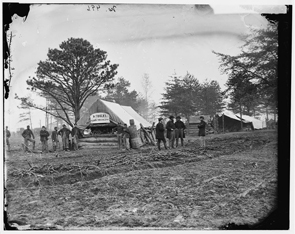
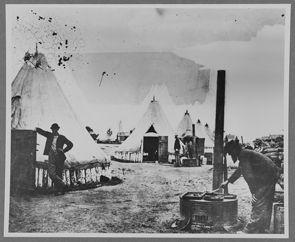
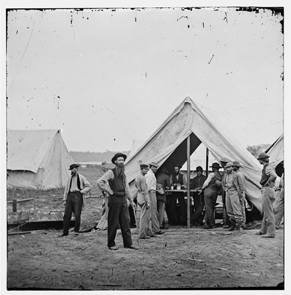
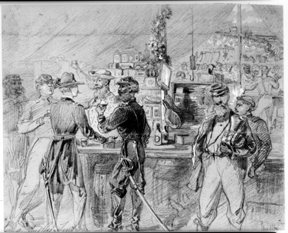
>Back to Top<
Now You Know
These Magic Lanterns Served as the First Home Theatres
Before Netflix, before cable television, before home movies, and before seemlingly endless slide shows of your neighbor's vacation in Idaho, there was the magic lantern - a nineteenth-century kerosene illuminated projector for glass slides.
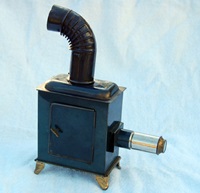
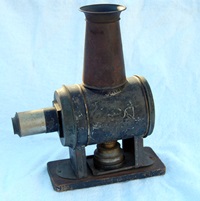
They came in various sizes and configurations like the two pictured in the last issue (left and right). Each has a lens at the end of the tube projecting from the front and a chimney on top to vent the oil lamp's fumes.
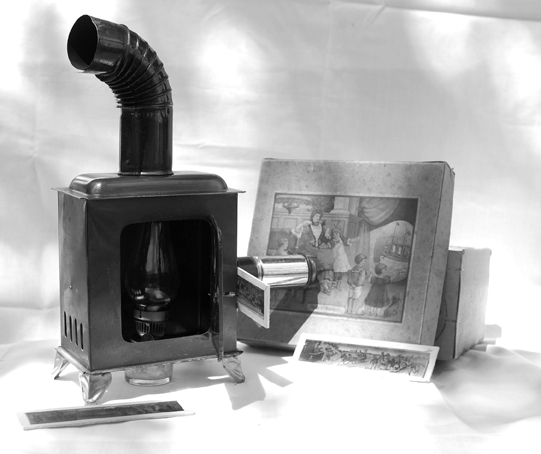
The oil lamp can be seen at the bottom of lantern pictured top right and inside the open door of lantern in image above. That lantern was a child's toy, and when disassembled will fit inside the 6" box beside it. The box bears a beautiful illustration of a Victorian family enjoying a slide show . You can see a hand painted glass slide loaded into the projector right behind the lens and one lying in front of the projector.
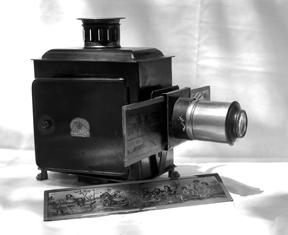
The projector left is a larger version with slides that are 2 1/4" x 7 3/4" hand painted color slides depicting children fishing.
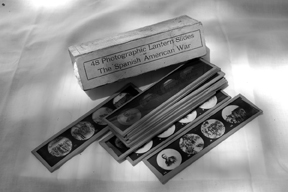
Aside from entertainment, magic lantern shows could also be instructive, and left photo depicts a collection of slides, for just such a purpose. Instead of hand painted slides, the box contains photographic slides of the Spanish-America War.
"Directions for using" were printed on the inside of the top of the box that contained lantern #4: "Place the Lantern on a table, the lenses facing a smooth white sheet at a distance of about 3-5 feet. See that the wick of the lamp is cut even, then light the lamp which you have filled with petroleum. Let the flame be as large as it is possible without smooting. Put the lamp into the lantern in a way that the screw of the wick is on one side. Now place the slide upside down in the lantern, adjusting the focusing tube by moving it either in or out until the picture is distinctly seen on the white sheet. If the table is at a farther distance, the pictures will be much larger, but not as distinct. The nearer the lantern is standing to the sheet, the more distinct but smaller the pictures will be. The room must be perfectly dark.
>Back to Top<
What Do You Know?
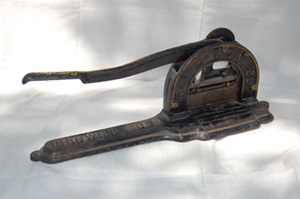
The item pictured above is made of cast iron and is painted black. It is 7" tall and 19" long with a long lever handle at the top. There is a small hole through the small protrusions at each end.
Do you know what it is? Email your answers to jboehling@verizon.net
>Back to Top<
News 2013: Second Quarter
First Quarter | Third Quarter | Fourth Quarter
Home | Henrico | Maps | Genealogy | Preservation | Membership | Shopping | HCHS
|











